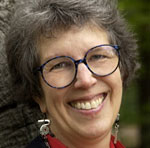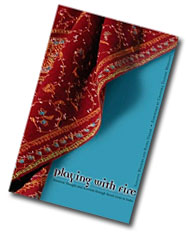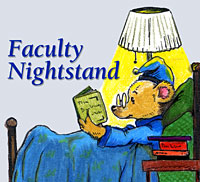UC Berkeley Web Feature
Faculty Nightstand: Louise Fortmann recommends some 'elementary' reading
|
BERKELEY – When deciding what to read in her spare time, rural sociologist Louise Fortmann might be influenced by a book's topic, a friend's recommendation, or a review. "Sometimes, honest, it's the cover," she admits.
The two books that Fortmann describes here, however, made it onto her nightstand thanks to her admiration for their authors. Fortmann had read a previous book by Orhan Pamuk, who won the 2006 Nobel Prize for Literature, and had been very impressed by Richa Nagar's innovative and emancipatory work when she met her at Stanford.
Snow
Orhan Pamuk
Vintage, 2004
Playing with Fire:
Feminist Thought and Activism through Seven Lives in India
Sangtin Writers and Richa Nagar
Minnesota University Press, 2006
 Louise Fortmann (Photo by Lynnly Labovitz) |
Louise Fortmann, professor of natural resource sociology and Rudy Grah Chair in Forestry and Sustainable Development:
Snow and fire, Turkey and India, authors' names that trigger my xenophobic spell checker — a novel and a nonfiction account that connect around the complexity of boundaries and the kinds of violence they can produce. Read them both — you'll be riveted!
 In "Snow," Orhan Pamuk thoughtfully tells readers
like me, who never get the symbols, that snow (which
is omnipresent, almost a character, in the story) is
a boundary state between other forms of water. The
story — in
which Ka, an expatriate Turkish poet, returns from
Germany and is asked to look into the suicides of "head-scarf" girls
in the remote mountain town of Kars — leads the
reader around and through boundaries between religious
fundamentalism and secularism, metropolis and backwater,
Turkey and the West, rich and poor. And that's
all a barefoot rural sociologist is brave enough to
say about this amazing book.
In "Snow," Orhan Pamuk thoughtfully tells readers
like me, who never get the symbols, that snow (which
is omnipresent, almost a character, in the story) is
a boundary state between other forms of water. The
story — in
which Ka, an expatriate Turkish poet, returns from
Germany and is asked to look into the suicides of "head-scarf" girls
in the remote mountain town of Kars — leads the
reader around and through boundaries between religious
fundamentalism and secularism, metropolis and backwater,
Turkey and the West, rich and poor. And that's
all a barefoot rural sociologist is brave enough to
say about this amazing book.
"Playing with Fire" also explores maintaining and crossing boundaries, using blended diary entries and reflections of nine contemporary Indian women, the Sangtin Writers. "[S]angtin," the book's introduction explains, is a term of "solidarity … used by a woman to refer to her close female companion who sees her through the trials and tribulations of life." One fiercely defended boundary is right on the book cover, which lists the authors as "Sangtin Writers and Richa Nagar" rather than as "Sangtin Writers," as the nine authors had requested. Western academic presses, for which collective creative processes are unimaginable and unacceptable, require an Author.
 Seven of the Sangtin Writers,
the autobiographers, worked as village mobilizers for
an Indian non-governmental organization for empowering
rural women; the eighth, Richa Singh, was a program
coordinator in the NGO; and Richa Nagar is a professor
at the University of Minnesota. The group worked together
for three years writing and discussing. The seven autobiographers
write (often with pain) of their struggles (and sometimes
failures) to overcome boundaries of caste, class, propriety,
religion, education, and sexism. As children,
wives, and daughters-in-law, they endure physical and
emotional deprivation, heavy workloads, beatings, and
mockery. The book is rich with reflections on the realities
of being a poor girl or woman in rural Uttar Pradesh, including the special cruelties that come if you are
Muslim or dalit, from an underprivileged caste "subject
to practices of untouchability."
Seven of the Sangtin Writers,
the autobiographers, worked as village mobilizers for
an Indian non-governmental organization for empowering
rural women; the eighth, Richa Singh, was a program
coordinator in the NGO; and Richa Nagar is a professor
at the University of Minnesota. The group worked together
for three years writing and discussing. The seven autobiographers
write (often with pain) of their struggles (and sometimes
failures) to overcome boundaries of caste, class, propriety,
religion, education, and sexism. As children,
wives, and daughters-in-law, they endure physical and
emotional deprivation, heavy workloads, beatings, and
mockery. The book is rich with reflections on the realities
of being a poor girl or woman in rural Uttar Pradesh, including the special cruelties that come if you are
Muslim or dalit, from an underprivileged caste "subject
to practices of untouchability."
Toward the end we learn that, having overcome the boundaries in their own homes and communities, the Sangtin faced hierarchical boundaries within the NGO for which they worked. Higher rank in the organization meant better travel accommodations, special seats in meetings, higher allowances, higher salaries and outside credit for the work that is done. Indeed — as described in a postscript by Nagar — the Sangtin Writers were attacked by the organization for publishing the Hindi version of this book. The NGO was by no means unique in this, nor in its pandering to donor wishes, nor in its silencing the thoughts and insights of lower-ranked workers. "Playing with Fire" is at once an epic of women discovering their own strengths and weaknesses and learning to analyze and speak for themselves, and a cautionary tale of the dangers of donor-funded "NGO-ization" in which an unaccountable elite presumes to speak for the dispossessed.
Previously on Faculty Nightstand: Professors Scott Saul, Julia Hastings, and David Presti
Read something you'd like to share? Don't wait to be invited — e-mail us.


